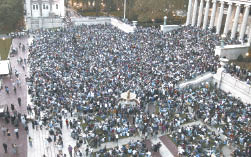 |
|
Drawing a crowd: Students at Columbia University stood outside to watch the candidates speak at the service summit. Photo: Ian Kwok/Columbia Daily Spectator |
New York—More than 750 people gathered here last month for what someone called “a party built around service.”
Officially, it was the first national service summit by the ad hoc group called ServiceNation. Unofficially, it was two days of frenzy punctuated by a lot of glad-handing and socializing.
The first day, Sept. 11, brought the two main presidential candidates to the same stage of Columbia University where each was questioned – separately, while seated in an easy chair – about his views of service and what his administration would do to encourage citizen participation.
The polite, invited crowd of about 1,100 financiers, philanthropists, heads of nonprofits and family members of 9/11 victims and a smattering of Columbia students endured the vagaries of public-forum-for-television, including inconvenient breaks for a bevy of commercials, as moderators Judy Woodruff of PBS and Rich Stengel of Time bounced mostly softball questions off the two candidates.
Sen. Barack Obama, D-Ill., ticked off his ambitious and expensive service package ($3.5 billion a year), which would double the number of Peace Corps volunteers, more than triple the current AmeriCorps force, provide educational tax credits for volunteers and add a laundry list of new corps to tackle such issues as education, health and conservation.
Asked if he thought he’d get backing for his plan, Obama said he doesn’t expect it to be approved as is. “That’s not the way legislation works. But I believe we’re in one of those special moments, one of those defining moments, where the American people recognize that we are not on the right track. … They expect leadership from Washington, but they understand they have to be a part of the solution as well.”
Sen. John McCain, R-Ariz., said he wants to expand AmeriCorps and basically supports many other service projects, as long as they don’t come with a government price tag.
“We have a distinct government role – the Peace Corps, AmeriCorps, all of these other organizations,” McCain said, when asked whether he backs the kind of service plan that Obama proposes. “But I want to be careful about expanding it. … My philosophy is, let’s not have government do things that the private sector can do, or other organizations can do.”
The candidates pledged to support the Serve America Act introduced last month by Sens. Edward Kennedy (D-Mass.) and Orrin Hatch (R-Utah) which would increase AmeriCorps from 75,000 slots a year to 250,000, expand the Peace Corps and provide stipends for youth who volunteer in low-income, high-need areas. The bill would cost $5 billion over five years.
Although only 100 of their fellow students were allowed in the Roone Arledge Auditorium for the forum, some 7,500 Columbia students gathered in Low Plaza, in the center of the main campus, to watch the forum on a giant mobile screen, cheering and clapping as the candidates spoke inside.
The summit was organized by Alan Khazei, founder and CEO of Be the Change Inc., and was designed to build on the spirit of cooperation and service that emerged after the 9/11 attacks. ServiceNation has a budget of $2.8 million, and has received $500,000 from the Carnegie Corp. and unspecified amounts from Target, AARP, Home Depot and numerous smaller foundations.
What Happens Now?
Thursday night’s solemn occasion morphed into Friday’s heavily scripted and produced pep rally, which included speakers who seemed to have been added more for their glamour or popularity than for what they added to the discussion of national service.
An example was singer Alicia Keys, whose Keep a Child Alive foundation provides medicine and support for African families ravaged by AIDS. Most of her short speech was her repeatedly saying how happy she was to be there.
Much of the program consisted of the well-heeled talking about their personal foundations; speakers commending participants for existing programs; youths born into unfortunate circumstances speaking about how a program changed their lives; and nonprofit leaders talking about their need for more government funding.
Several participants said they believed the event helped to raise awareness of national service, but wondered where the ServiceNation effort goes next.
Iris Chen, CEO of the New-York based I Have A Dream Foundation, wondered what would happen to maintain the momentum of the ServiceNation movement, organized, as it was, around this election year.
“This could be great if it could bring in 175,000 people every year,” said Richard Murphy, head of New York-based Youthline America, which runs several programs to boost youth involvement in community and national affairs. “That could be the catalyst to bring attention to a very weakened and underfunded infrastructure” for service, Murphy said.
The event was to be followed up by a national Day of Service on Sept. 27, for which some 3,000 programs were scheduled around the country.
Scant attention was paid to the hurricane that at the very same time was devastating Galveston and Houston, although those scenes were constantly on the television monitors in the New York Hilton’s elevators that carried participates from session to session.
Contact: Be the Change (617) 252-2420, www.bethechangeinc.org.































